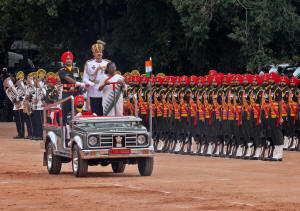|
Murmu's elevation to India's highest constitutional post has
been seen as an important gesture of goodwill by Prime Minister
Narendra Modi to the communities that make up more than 8% of
its 1.4 billion people ahead of a general election due by 2024.
Murmu, a former teacher and state minister from Modi's Bharatiya
Janata Party (BJP), is the second woman to hold the largely
ceremonial role of president. She was born into a poor family of
the Santhal tribe from the eastern state of Odisha.
Members of parliament and of state legislatures elected Murmu
last week for a five-year term after she was nominated by the
BJP.
"My election is proof of the fact that the poor in India can
have dreams and fulfil them too," Murmu, 64, said in a speech
https://pib.gov.in/PressReleseDetail.aspx?PRID=1844557 in
parliament after taking the oath of office.
"It is a matter of great satisfaction for me that those who have
been deprived for centuries and those who have been denied the
benefits of development, those poor, downtrodden, backwards and
tribals are seeing their reflection in me."
Modi hailed Murmu's swearing-in a "watershed moment for India,
especially for the poor, marginalised and downtrodden".
India's president acts as the Supreme Commander of the Armed
Forces but the prime minister holds executive powers.
The president can play an important role during political
crises, such as when a general election is inconclusive, by
deciding which party is in the best position to form a
government.
(Reporting by Krishna N. Das; Editing by Robert Birsel)
[© 2022 Thomson Reuters. All rights
reserved.]
This material may not be published,
broadcast, rewritten or redistributed.
Thompson Reuters is solely responsible for this content.

|
|




